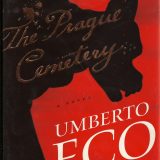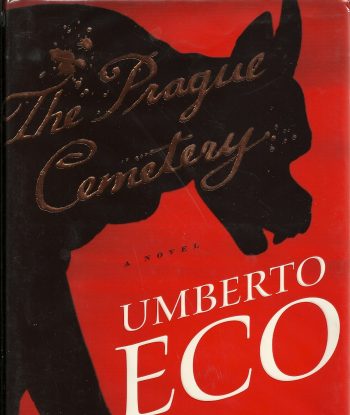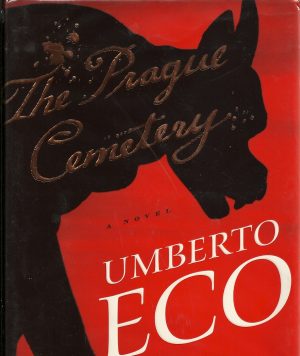The Prague Cemetery – Umberto Eco – 2010
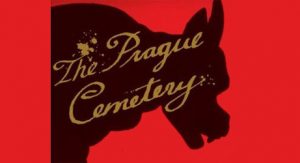
Posted by Sterling on 12/10/2012, 22:51:01,
Actually, I don’t know if I’m going to reveal any spoilers or not. At the moment I have some random thoughts that do not cohere. I’d like to share them anyway.
- 1. From a narrative point of view, I didn’t think that the split personality device was successful. It unnecessarily complicated an already highly complex story. I’m not sure how much it added. If it were a surprise to us that Dalla Piccola and Simonini are the same person, it might have been a dramatic pay-off (although a rather cheap one). However, we know DP’s identity from the beginning.
- 2. Why would Simonini be so unfamiliar with German rules of pronunciation as to spell Freud’s name as Froide? Plus, for the record, I doubt that Freud’s thought had evolved to this point at the time. The Interpretation of Dreams, Freud’s first major work, was not published until 1899. Freud’s thought evolved throughout his life, especially in the years from 1900 until his death in 1939. Eco allows Simonini to have learned insights into his unconscious that lay many years in Freud’s future.
- If this were entirely a novelist’s fabrication, it would be a lurid, slightly distasteful entertainment. The idea that almost everything is true is utterly dumbfounding. In this light, the book becomes truly horrifying. For example it is in questionable taste at best to introduce the phrase the “Final Solution” into the novel, unless it really was current in the 19th century and not a Nazi invention.
- At first, Simonini’s bigotry towards everyone is ridiculous and even amusing. For me, it eventually became heavy sledding to make it through the relentless anti-Semitism. Of course I understand that Eco is not condoning it, but to live that close to a narrator filled with hatred can be stifling.
- 5. It may have been necessary to introduce the Masons as major players in the plot because of historical accuracy. However, I found it distracting and confusing. Not to mention, I am deeply indifferent toward Freemasonry, either way. I should think that most readers are interested in the roots of the insane anti-Semitism of the Nazis and the genesis of the infamous Protocols.
- 6. The black mass (and especially Diana’s sexual assault on Dalla Piccola) was jaw dropping. I know DP is a fictitious character, but supposedly the rest of them are real. Could the black mass account possibly be true?!?
- 7. I basically enjoyed reading the novel. I think it is a minor work compared to The Name of the Rose and Foucault’s Pendulum, the only other works I’ve read by Eco. Does anyone know if his other novels are any good? Baudolino sounds interesting.
~
Posted by Steven on 14/10/2012, 9:41:58.
I finished The Prague Cemetery last night. It was one of those books that I wasn’t sure about as I was reading it, but in the end decided that it was quite worthwhile. For starters I’ll just post my comments as responses to Sterling’s.
1. From a narrative point of view, I didn’t think that the split personality device was successful. It unnecessarily complicated an already highly complex story. I’m not sure how much it added. If it were a surprise to us that Dalla Piccola and Simonini are the same person, it might have been a dramatic pay-off (although a rather cheap one). However, we know DP’s identity from the beginning.
There’s this quote at the beginning of Chapter 11 where the anonymous Narrator is speaking: “To be frank, if it were not for the fact that these pages refer to events that actually took place, such alternations between amnesiac euphoria and dysphoric recall might seem like a device of the Narrator.”
I don’t think Eco ever intends to mislead us into thinking Simonini and and Dalla Piccola are anything but the same person. But schizophrenia and duality are pervasive. Every agent, it seems, is a double agent. Every action has a dual or hidden purpose. Truth itself, he seems to be saying, has two faces, and memory is selective in which it sees.
By making “Narrator” a character, he also may be telling us we can’t trust what we are reading either.
2. Why would Simonini be so unfamiliar with German rules of pronunciation as to spell Freud’s name as Froide?
I think that was a deliberate error on Simonini’s part to cover up his embarrassment at having turned to a Jew for help. It reminds me of the way many people around here will deliberately and exaggeratedly mispronounce foreign names and terms to show their xenophobia.
3. If this were entirely a novelist’s fabrication, it would be a lurid, slightly distasteful entertainment. The idea that almost everything is true is utterly dumbfounding. In this light, the book becomes truly horrifying. For example it is in questionable taste at best to introduce the phrase the “Final Solution” into the novel, unless it really was current in the 19th century and not a Nazi invention.
I found it a bit more intriguing than horrifying–for example the idea that the Dreyfus affair was a concoction that used anti-Semitism as a blind to mislead German intelligence rather than being a direct attack on Jews. I assume this is conjecture on Eco’s part, but it does appear that the document in question refers to 120mm artillery, whereas the “French 75” would turn out to be one of the most famous weapons in history.
4. At first, Simonini’s bigotry towards everyone is ridiculous and even amusing. For me, it eventually became heavy sledding to make it through the relentless anti-Semitism. Of course I understand that Eco is not condoning it, but to live that close to a narrator filled with hatred can be stifling.
I guess I went the opposite direction and began to laugh off the anti-Semitism the more exaggerated it became. Of course it’s obvious that Simonini himself is everything he accuses the Jews of being, not to mention having a name that is of Hebraic origin.
5. It may have been necessary to introduce the Masons as major players in the plot because of historical accuracy. However, I found it distracting and confusing. Not to mention, I am deeply indifferent toward Freemasonry, either way. I should think that most readers are interested in the roots of the insane anti-Semitism of the Nazis and the genesis of the infamous Protocols.
Yes, the Freemasons don’t seem to have a necessary role in the novel except that they were obviously a part of the rampant conspiracy notions of the time. They and the Rosicrucians, who are also mentioned, play a much bigger part in Foucault’s Pendulum.
6. The black mass (and especially Diana’s sexual assault on Dalla Piccola) was jaw dropping. I know DP is a fictitious character, but supposedly the rest of them are real. Could the black mass account possibly be true?!?
There is a similar scene in Huysmans’ Là-Bas, which I read last month, and Huysmans supposedly wrote from personal observation of a black mass conducted by Boullan. He describes a number of variations in the ceremony. Eco’s rendition is actually milder than most.
I found the distinction between Satanism and Luciferism interesting. This is something Huysmans doesn’t bring up.
7. I basically enjoyed reading the novel. I think it is a minor work compared to T he Name of the Rose and Foucault’s Pendulum, the only other works I’ve read by Eco. Does anyone know if his other novels are any good? Baudolino sounds interesting.
I completely agree that this is a good minor Eco novel.
In addition to the two you mention I’ve also read The Mysterious Flame of Queen Loana. It is the story of a man suffering from amnesia who tries to reconstruct his past by exploring the relics of his childhood–especially books–stored in his parents’ attic. There are many thematic similarities with The Prague Cemetery, as many of the fond memories he reconstructs turn out, on further exploration, to have a darker face. I would rate it a good minor work as well.
The subject of selective memory brings back to mind The Sense of an Ending, doesn’t it?
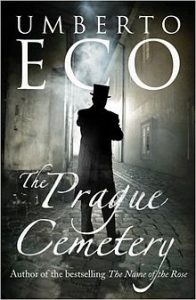
Posted by Guillermo Maynez on 15/10/2012, 12:54:56,
I agree with you (Steven and Sterling) that this is a very good minor work by Eco. I enjoyed it a lot, and for several reasons. My father (deceased) used to believe that the Protocols of the Wise Men of Sion were REAL. That they constituted proof of a worldwide conspiracy by the Jews to conquer the world. Not that he was a racist bigot, mind you; he was one of the kindest, most benevolent people on Earth. But he did believe in the Protocols, until I proved to him that the whole thing was a scam, and as it turns out, the conspiracy was in the concocting of the Protocols, and not the other way around. As the story was progressing, I suddenly told myself: “This is going to end up with this guy writing the Protocols!” And it did. I think Eco must have had great fun writing this book, a lighter conspiracy novel when compared to “Foucault’s Pendulum”. I think his idea was basically to tell the real story, crazy as it is, and fill in the blanks with this great character, one of the most despicable rascals in literature.
It’s funny how people’s prejudices run. My father was a fundamentalist Christian who believed that Catholicism was a conspiracy to rule the world and the pope was the antichrist. On the other hand he felt very kindly towards Jews because they were “God’s chosen people.” I doubt that he had ever heard of the Protocols.
I’m sure Eco had fun with The Prague Cemetery, but it’s also very impressive how he ties all these historical events together around Simonini. It seems effortless, but I’m sure it wasn’t. There has been lots of bad historical fiction written in which a person unknown to history just happens to be at hand and play a key role in one major even after another, but this novel never has that taint. Perhaps making Simonini a villain is what makes the story more acceptable (I won’t say “believable,” because I don’t think we’re expected to go that far).
~
Posted by Lale on 17/10/2012, 7:26:30
I found all the Italian history a little confusing and the book as a whole difficult to read but there were portions I enjoyed a lot.
I thought the narrator, Simonini and Dalla Piccola shared the story in a fun way. The Jewish obsession was meant to be ridiculous and therefore funny, and I thought it was. It is so absurd it is funny.
I know the Dreyfus affair inside out, having read about it from a variety of sources, wrote a school paper on it (and even watched a black and white movie). It was a surprise when it came up in the book.
My husband says that this is a Forest Gump story with a dark side.
~
Posted by Guillermo Maynezon 17/10/2012, 12:51:27
As for the Forrest Gump analogy, it’s good. Only this Forrest Gump is much, much more evil. As I said before, he’s one of the most despicable characters in literature.
Posted by Sterling on 17/10/2012, 13:10:33
I agree that Eco does indeed hold anti-Semitism up to ridicule. However, the Protocols really exist and were accepted by many, many people (including Hitler) as true. The description of the outlandish anti-Semitism of the late 19th century is, for the most part, true. It paved the path for the Holocaust. Consequently, the comedy is this novel strikes me as not just dark, but pitch black.
~
Posted by Sterling on 18/10/2012, 22:26:40
I believe it was I who suggested that we keep politics out of our discussions, but, having brought up the Holocaust directly, I feel that I must address it in the context of The Prague Cemetery.
There are some things in history that I don’t believe can be argued by reasonable people. Slavery in the American colonies and later in the United States is one of these. When I really think of it, it’s astounding that a practice that sounds like something out of ancient history should have been practiced so recently. Having said that, I often avoid novels that address slavery or specifically African-American issues. I already know it’s bad. I don’t need to subject myself to another anti-racist screed. It’s “preaching to the choir” for me. That’s one of the reasons I liked Invisible Man so much. It is not a novel about the Black Experience. It’s a novel that illuminates the experience of all of us.
Similarly, the Holocaust is obviously one of the most horrible crimes ever. I certainly do not need to be reminded of this. This does not always play out well in literature. I don’t really enjoy being beaten over the head by the horror of it all. I’ve known this all my life. Sometimes I’ll read a novel that is a kind of apologia for the American South (Gone With the Wind comes to mind). You’re not likely to see fiction taking the Nazi’s side outside a gathering of White Power skinheads. Which brings me to The Prague Cemetery.
Of course Eco is mocking the outlandish anti-Semitism of the late 19th century. He obviously does not expect us to sympathize with Simonini. But when he uses the phrase “the Final Solution,” which everyone knows is the Nazi’s term for the death camps, the tone of the novel is thrown off. I think it would have been better for him to allow us to revel in the fin-de-siècle grotesquerie and decadence, permitting us to make the connection ourselves between this behavior and Germany a mere forty years later.
But I still enjoyed it.
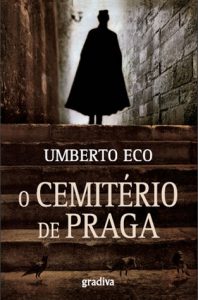
Posted by Guillermo Maynezon 20/10/2012, 11:30:26
Sterling: I agree with you. At some point, and I don’t remember exactly what movie it was, I went out of cinema thinking: “OK, the Holocaust was horrible. I guess I’ve seen all the films I was going to watch in my life about it”. And then you learn about the things they do with the Palestinians and feel sad they seem not have learned from their past.
Same with our recent “war-on-crime” horror here in Mexico. A few months ago I watched a movie, the Umpth about it. It was good, but I decided I’d had enough of corpses and beheadings. You can imagine how many Narco novels there are now in the Mexican bookshops. I’ve decided to stay away from them.
~
Posted by Steven on 27/10/2012, 12:38:14
Here’s my usual roundup of passages I flagged while reading. (The page numbers are, of course, from my copy and so I can refer back to them; they may be different on yours.):
page 100: “It is better not to fill the heads of government agents with too much information. All they want is clear, simple ideas–black and white, good and bad, and there must be only one villain.”
Substitute “politicians” for “government agents” and you have a very apt description of American foreign policy for as long as I can remember.
Page 170: “Please understand that the Narrator is himself puzzled…. To be frank, if it were not for the fact that these pages refer to events that actually took place, such alternations between amnesic euphoria and dysphoric recall might seem like a device of the Narrator.”
Funny how Eco whimsically calls attention to his narrative device (having Simonini and Dalla Piccola as alter egos) by claiming that it is not a device, and says that it is real when it’s actually the only part of the novel that isn’t real.
Page 308: “A mystic is a hysteric who has met her confessor before her doctor.”
Sounds true to me.
Page 350: “Jesus was in fact of the Celtic race, like we French…”
This sounds silly, but I don’t know how many times growing up among evangelicals I heard fanciful theories tying Jesus racially to England and America, asserting that he spoke English, etc.
Is anyone ready to start reading The Thousand Autumns…?
~
Posted by Sterling on 27/10/2012, 20:22:
Page 350: “Jesus was in fact of the Celtic race, like we French…”
This sounds silly, but I don’t know how many times growing up among evangelicals I heard fanciful theories tying Jesus racially to England and America, asserting that he spoke English, etc.
Really? I had no idea that anyone seriously believed such things. I was aware of the tradition that Joseph of Arimathea (who donated Jesus’ tomb) was Jesus’ uncle (or great-uncle). According to this legend, Joseph was a tin merchant who had occasion to visit Cornwall accompanied by his young nephew Jesus. This legend is the basis for Blake’s poem “And did those feet in ancient time,” famously set to music as “Jerusalem.” While unlikely, this legend doesn’t seem impossible, but asserting that Jesus was an American? I suppose you’d have to be Mormon to swallow that one!
: Page 308: “A mystic is a hysteric who has met her confessor before her doctor.”
Yes, that one jumped out at me, too. It has the feel of a clever aphorism like a bon mot of Oscar Wilde. It manages to insult both psychiatry and religion in one sentence! :^)
Is anyone ready to start reading The Thousand Autumns…?
I have started it, but just barely. It’s going to be awhile before I’m through and ready to discuss it. It has caught my interest from the first page, though.
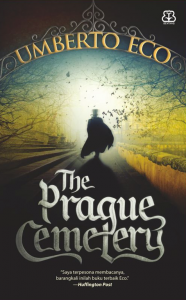
Posted by Steven on 27/10/2012, 22:07:33
: …but asserting that Jesus was an American?
No, not directly of course, but my father and his church believed that England and America were somehow the two lost tribes of Israel, so this made it possible for them to envision an Anglo-Saxon-appearing Jesus just as those in The Prague Cemetery convinced themselves that Jesus was a Celt.
~
Posted by Guillermo Maynezon 29/10/2012, 17:28:37
WOW!! I have heard preposterous ideas about Jesus before, but never that he was an Englishman or that he had visited Cornwall. Surely those lies come from the anxiety to relate to Jesus in a racial, ethnic way, and deconstruct him as a Jew. My own belief is he never existed; it’s a hoax compounded from different preachers living at the time of the Roman domination of Palestine.
In Mexico there is the legend that the God Quetzalcoatl (the feathered serpent), described in his human form as a “White, bearded man”, was in fact Saint Thomas, who arrived in the coast of Veracruz to evangelize the prehispanic Indians. So…
~
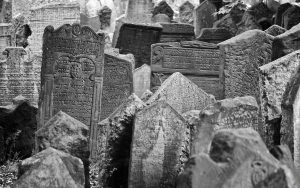
An excellent review can be found here:
- Related:
- Book Reviews


